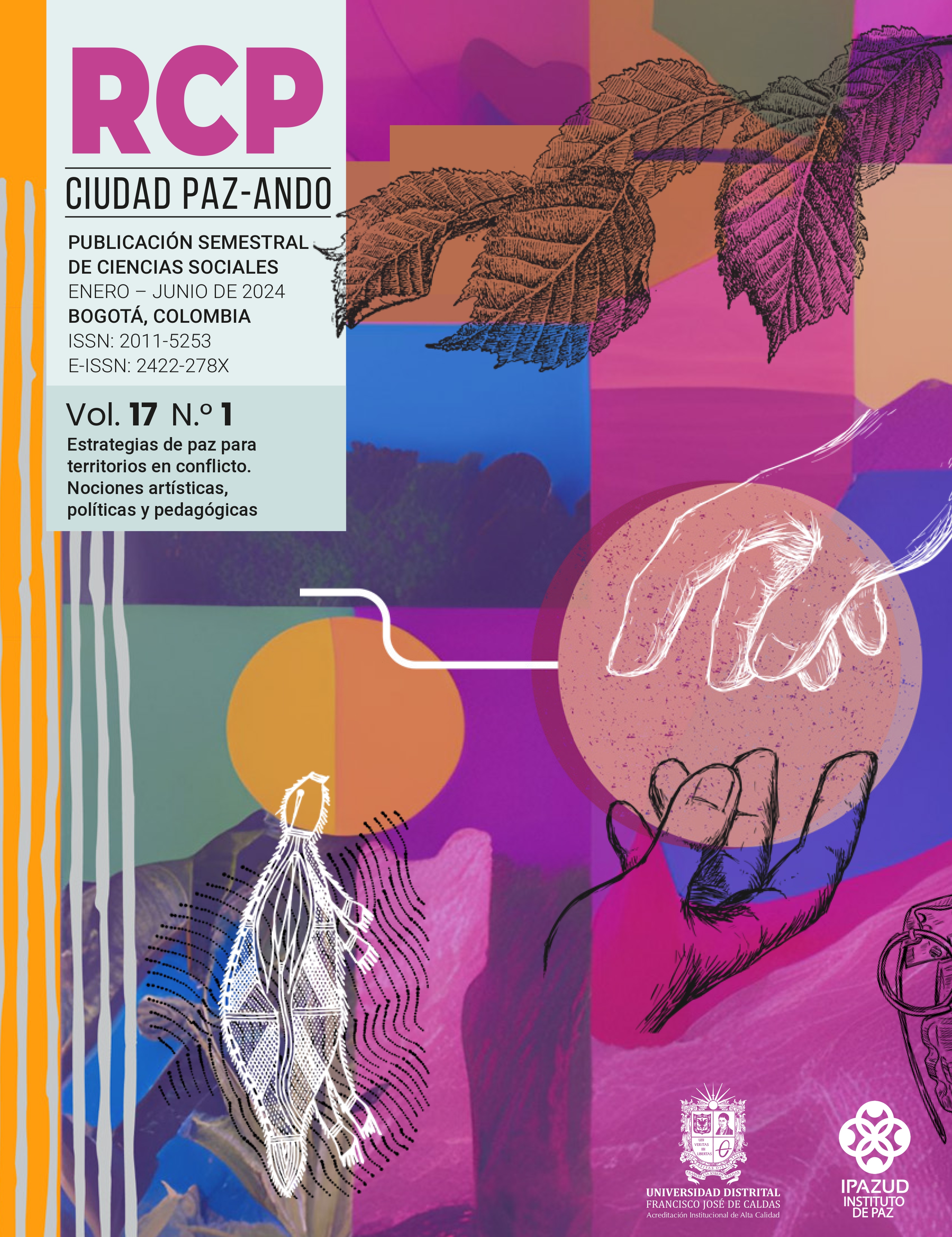DOI:
https://doi.org/10.14483/2422278X.21913Published:
2024-06-13 — Updated on 2024-06-13Un Abordaje “Indisciplinado” de la Guerra, la Violencia y la Paz en Colombia. Reseña de “Belicopedia”
Keywords:
Violencia, Reseña, Belicopedia, Guerra, Paz (es).Downloads
Abstract (es)
Reseña de: Ruiz, D. y Ojeda, D. (2023). Belicopedia. Universidad de los Andes.
References
Felt, U.; Fouché, R.; Miller, C.; y Smith-Doerr, L. (Eds.). (2017). The handbook of science and technology studies. MIT Press.
Hernández, M. y Guerrero, H. (2022). Aproximación al informe de la masacre de El Tigre (Putumayo - Colombia) elaborado por el Grupo de Memoria Histórica desde los Estudios sociales de la Ciencia y la Tecnología. En S. Lago y J. Burga (Eds.) Cruzando puentes: recientes estudios en ciencia, tecnología y sociedad en América Latina y el Caribe (pp. 25-43). Asociación Latinoamericana de Sociología Perú - Universidad de Buenos Aires.
Kant, I. (1998). Crítica de la Razón Pura. Alfaguara.
Latour, B., y Woolgar, S. (1979). Laboratory Life: The Construction of Scientific Facts. Princeton University Press.
Law, J. (2004). After Method. Mess in social science research. Routledge.
Law, J. (2017). STS as method. En U. Felt; R. Fouché, C. Miller, y L. Smith-Doerr, (Eds.). The handbook of science and technology studies (pp. 31-57). MIT Press.
Mora, F. (2013). Reconocer a los reclamantes: sobre el Registro Único de Víctimas en Colombia como ensamblado sociotécnico. IM-Pertinente, 1(1), 11-32.
Mora, F. (2016). Reconocimiento de víctimas del conflicto armado en Colombia: Sobre tecnologías de representación y configuraciones de Estado. Universitas Humanística, 82, 75-101. https://doi.org/10.11144/Javeriana.uh82.rvca
Mora, F. (2023). The official record of victims as a bordering technology: knowledge and (in)visibilities in post-conflict Colombia. Science as Culture, 32(3), 344-362. DOI: 10.1080/09505431.2023.2221278.
Mora, F. y Brown, S. (2019). The psychosocial management of rights restitution: Tracing technologies for reparation in post-conflict Colombia. Theory & Psychology, 29(4), 521-538. https://doi.org/10.1177/0959354319863136.
Olarte, M. (2022). (Un)Doing the Colombian Armed Conflict: Forensic Knowledge Contradicting Bodies Unsettling Stories. Social Anthropology/Anthropologie Sociale, 30(3), 19-37. 10.3167/saas.2022.300303.
Olarte, M. y Castro, J. (2019). Notas forenses: conocimiento que materializa a los cuerpos del enemigo en fosas paramilitares y falsos positivos. Antípoda. Revista de Antropología y Arqueología, 34, 119-140. https://doi.org/10.7440/antipoda34.2019.06.
Olarte, M. y Pérez, T. (2020). Careful speculations: Toward a caring science of forensic genetics in Colombia. Feminist Studies, 46(1), 158-177.
Olarte, M.; Díaz del Castillo, A.; Pulido, N.; Cabrera, N.; y Suárez, R. (2015). Verdad e incertidumbre en el marco del conflicto en Colombia: una mirada a los sistemas de información como prácticas de memoria. Universitas Humanística, 79, 233-254. http://dx.doi.org/10.11144/Javeriana.UH79.vimcSuárez.
Rico, J. (2018). Non-human actors and the construction of a “failed” violence clarification commission: the case of the CHCV in Colombia. Análisis Político, 31(93), 43-59. https://doi.org/10.15446/anpol.v31n93.75616.
Ruiz, D. y Ojeda, D. (2023). Belicopedia. Universidad de los Andes.
How to Cite
APA
ACM
ACS
ABNT
Chicago
Harvard
IEEE
MLA
Turabian
Vancouver
Download Citation
License
Copyright (c) 2024 Ciudad Paz-Ando

This work is licensed under a Creative Commons Attribution-NonCommercial-ShareAlike 4.0 International License.
The Ciudad Paz-ando Journal (RCP) is an open access publication, without economic charges for authors or readers, whose biannual publications are made under the terms of the Creative Commons Attribution - Non-commercial - Share the same License (CC-BY-NC -SA 2.5 CO), with which others may distribute, remix, retouch, and create from the work in a non-commercial way, as long as they give credit and license their new creations under the same conditions.
The copyright holder is Ciudad Paz-ando journal, retaining all rights without restrictions, respecting the terms of the license regarding the consultation, download and distribution of the material.
When the work or any of its elements are in the public domain according to the applicable current law, this situation will not be affected by the license.
Likewise, we encourage authors to deposit their contributions in other institutional and thematic repositories, with the certainty that culture and knowledge is a good for all and for all.

